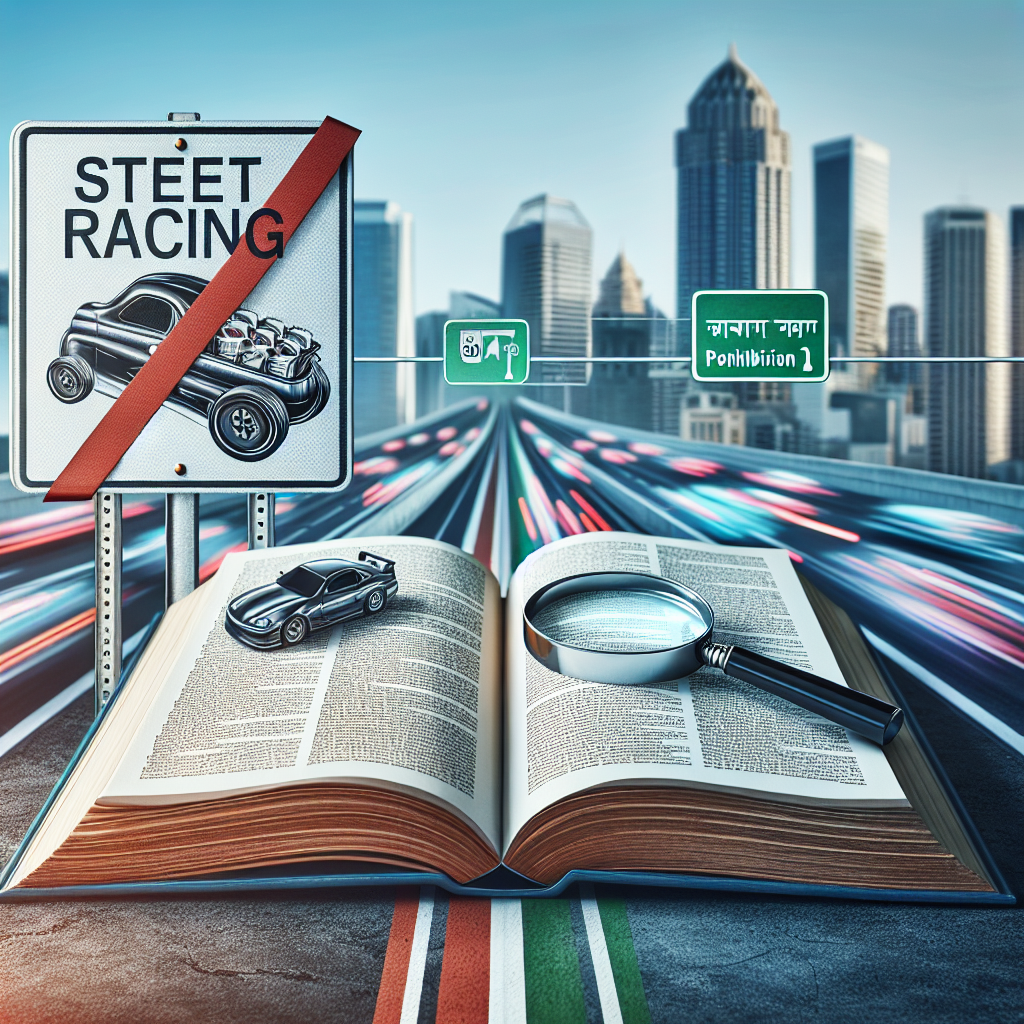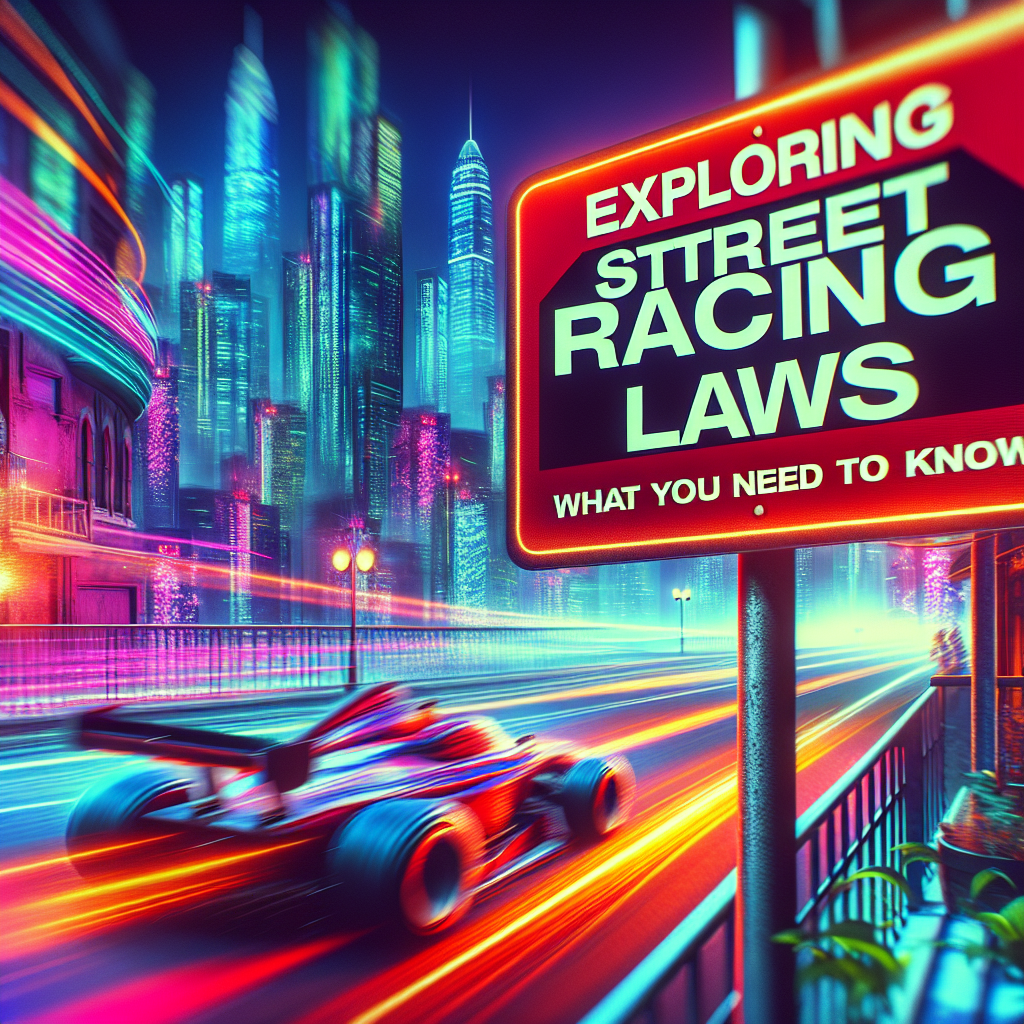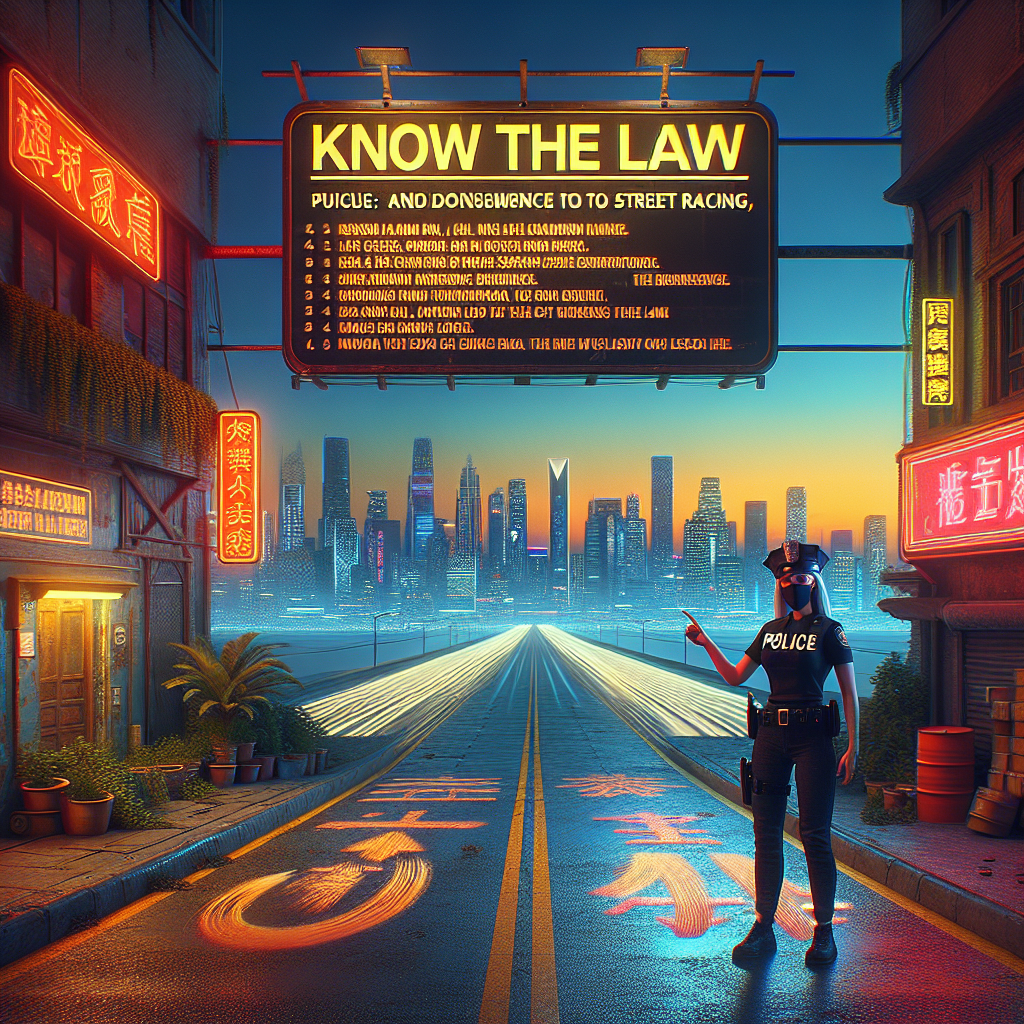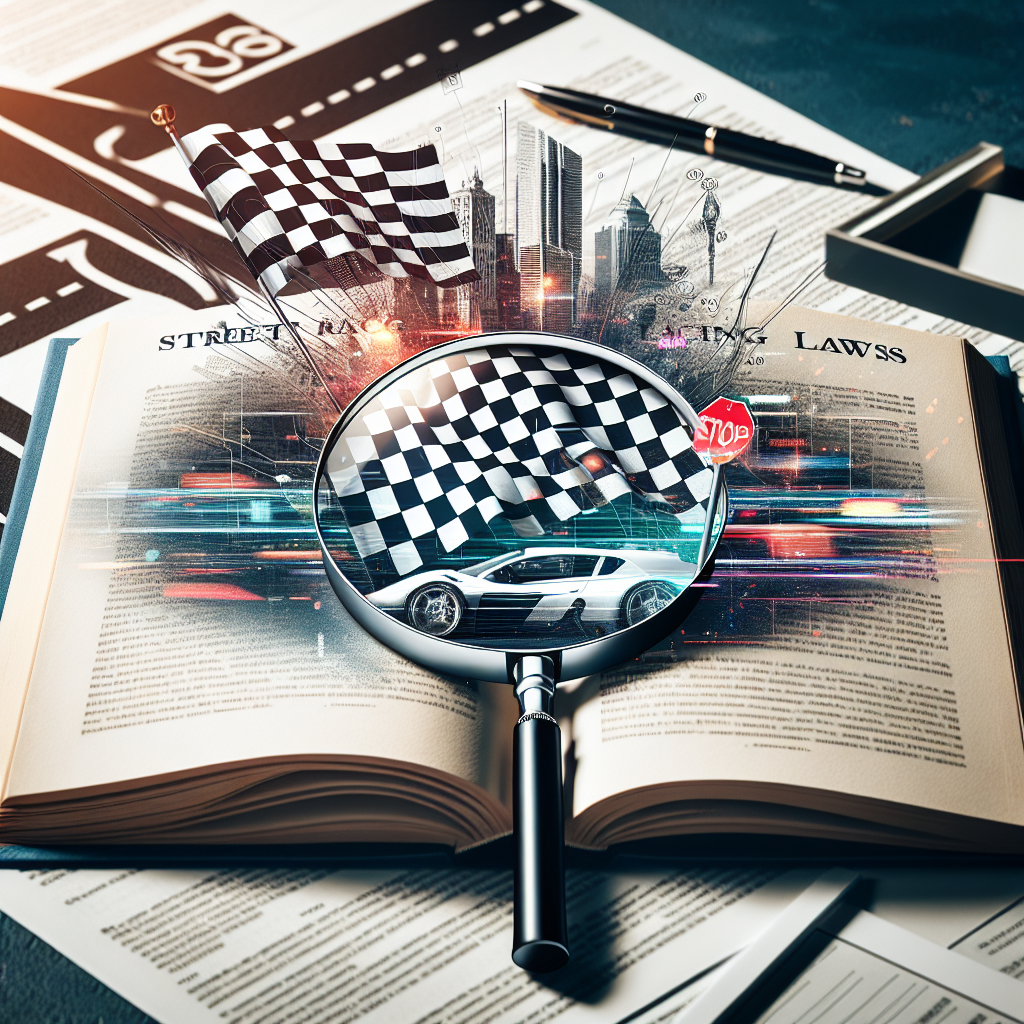Welcome to our guide on street racing laws in [Specific Location]. Street racing is a dangerous activity that puts not only the participants at risk, but also innocent bystanders and drivers on the roads. In [Specific Location], there are strict laws in place to prevent and punish those who engage in this illegal and reckless behavior. In this article, we will dive into the specifics of these laws, including the penalties for street racing, the consequences of being caught, and the measures taken by law enforcement to crack down on this dangerous activity. Stay tuned to learn everything you need to know about street racing laws in [Specific Location].
Understanding Street Racing Laws

Definition of Street Racing
- Street racing refers to the act of operating a motor vehicle in a competitive manner on public roads.
- This competitive driving often involves two or more vehicles accelerating in an attempt to outperform one another.
- Street racing typically takes place outside of organized racing events and can pose significant risks to participants and bystanders.
- It is important to distinguish between legal forms of racing, such as sanctioned events at designated tracks, and illegal street racing activities that occur on public roadways.
- Illegal street racing is often associated with reckless driving behaviors, excessive speeds, and disregard for traffic laws and safety regulations.
Impact of Street Racing
- Increased Risk of Accidents: Street racing significantly raises the risk of accidents, leading to severe injuries or even fatalities for drivers, passengers, and bystanders.
- Property Damage: The high speeds involved in street racing often result in property damage to vehicles, infrastructure, and surrounding areas, imposing financial burdens on individuals and communities.
- Noise Pollution: The loud engines and screeching tires associated with street racing contribute to noise pollution, disrupting the peace and tranquility of neighborhoods.
- Legal Ramifications: Individuals engaging in street racing face legal consequences such as fines, license suspension, and potential imprisonment, impacting their future opportunities and livelihoods.
- Community Disruption: Street racing activities disrupt the normal flow of traffic, causing inconvenience to residents, businesses, and emergency services, leading to strained community relations.
Current Legislation on Street Racing
Overview of Existing Laws
- Street Racing Definition: In [Specific Location], street racing is defined as the act of motor vehicles – including cars, motorcycles, or trucks – engaging in a speed competition on public roads or highways.
- Penalties for Street Racing: The legislation in [Specific Location] imposes strict penalties for street racing offenders, including fines, license suspension, vehicle impoundment, and even imprisonment depending on the severity of the offense.
- Participation and Spectating Laws: Not only participating in street racing but also spectating or facilitating these illegal activities is punishable by law in [Specific Location]. Law enforcement agencies actively target both racers and spectators to curb this dangerous behavior.
- Modified Vehicle Regulations: [Specific Location] has specific regulations regarding vehicle modifications that enhance speed and performance. Any vehicle found to have illegal modifications for street racing purposes can face fines and penalties.
- Enforcement Measures: Law enforcement in [Specific Location] employs various tactics to combat street racing, including increased patrols in known racing hotspots, undercover operations, and collaboration with local communities to report suspicious activities.
- Community Impact: Street racing not only poses a significant risk to public safety but also has a detrimental impact on the local community. Increased noise pollution, property damage, and the potential for accidents create a negative environment that authorities aim to eradicate through strict enforcement of existing laws.
Penalties for Street Racing
When it comes to street racing in [Specific Location], the penalties can be severe and are meant to deter individuals from engaging in this dangerous activity. The legislation surrounding street racing typically includes a range of consequences that aim to address the risks posed by this illegal behavior. Some of the key penalties for street racing in [Specific Location] include:
- Criminal Charges: Individuals caught street racing may face criminal charges, which can result in a criminal record that can have long-lasting implications on their future opportunities.
- Fines: Those convicted of street racing may be subject to hefty fines as a punishment for their actions. These fines can vary depending on the specific circumstances of the offense.
- License Suspension: In many cases, individuals caught street racing may have their driver’s license suspended for a certain period of time. This can impact their ability to drive legally and can pose significant inconveniences in their daily lives.
- Vehicle Impoundment: Additionally, [Specific Location] authorities may impound the vehicles involved in street racing incidents. This not only serves as a penalty for the individuals but also helps to prevent further instances of street racing using the same vehicles.
- Community Service: As part of the penalties for street racing, individuals may be required to perform community service hours. This serves as a way for offenders to give back to the community and understand the consequences of their actions.
- Increased Insurance Rates: Being convicted of street racing can also lead to significantly higher insurance rates, making it more costly for individuals to maintain coverage for their vehicles.
In conclusion, the penalties for street racing in [Specific Location] are designed to discourage this dangerous behavior and protect both the individuals involved and the general public. It is crucial for individuals to be aware of these consequences and to think twice before engaging in street racing activities.
Enforcement of Street Racing Laws
Police Measures
- Increased Patrols: Law enforcement agencies often conduct targeted patrols in known street racing hotspots to deter illegal racing activities and catch offenders in the act.
- Undercover Operations: Police may also use undercover officers and vehicles to infiltrate street racing groups and gather evidence for prosecution.
- Surveillance Techniques: Utilization of surveillance cameras, drones, and other monitoring technologies to track and record street racing activities for enforcement purposes.
- Collaboration with Other Agencies: Coordination with other relevant agencies such as traffic management authorities and local government to address street racing issues comprehensively.
- Seizure of Vehicles: In some cases, law enforcement may seize and impound vehicles involved in street racing as a punitive measure to discourage offenders.
Community Involvement
Enforcement of Street Racing Laws
In addressing street racing laws, community involvement plays a crucial role in both reporting and preventing incidents. Here are some key points to consider:
- Neighborhood Watch Programs: Many communities have established neighborhood watch programs where residents actively monitor and report suspicious activities, including potential street racing events. These programs serve as an extra set of eyes and ears for law enforcement.
- Anonymous Tip Lines: Some areas have set up anonymous tip lines specifically for reporting street racing activities. This allows individuals to provide information without fear of retaliation, encouraging more community members to come forward with relevant details.
- Awareness Campaigns: Community leaders often organize awareness campaigns to educate residents about the dangers of street racing and the importance of reporting such activities. These campaigns aim to foster a sense of responsibility among community members to keep their neighborhoods safe.
- Collaboration with Law Enforcement: Effective community involvement in combating street racing often involves collaboration with local law enforcement agencies. This partnership can lead to coordinated efforts in monitoring hotspot areas and taking swift action against offenders.
- Community Policing Initiatives: Some regions implement community policing initiatives that involve officers building relationships with residents to gain trust and encourage cooperation in addressing street racing issues. This approach can help bridge the gap between law enforcement and the community.
By actively engaging with the community, authorities can enhance their enforcement efforts and make strides in curbing street racing activities in the area.

Challenges in Regulating Street Racing
Jurisdictional Issues
Challenges in Regulating Street Racing
Street racing laws face significant challenges when it comes to jurisdictional issues. Enforcing these laws can be particularly complex due to the varying regulations in different regions.
- Legal complexities arise when street racing incidents occur near the borders of different jurisdictions, as determining which law enforcement agency has the authority to intervene can be unclear.
- Coordination between multiple agencies is crucial to effectively address street racing activities that cross jurisdictional lines. Lack of communication and cooperation between law enforcement entities can impede efforts to combat this dangerous behavior.
- Legislation discrepancies in different regions can lead to inconsistencies in the penalties for street racing offenses. This can create challenges in ensuring that offenders are held accountable appropriately regardless of where the offense takes place.
- Cross-border pursuits during street racing incidents can pose additional challenges, as law enforcement agencies must navigate the legal implications of pursuing suspects across jurisdictional boundaries. This raises concerns about safety, liability, and legal authority in such situations.
Navigating jurisdictional issues is vital in creating a cohesive approach to combating street racing and ensuring that laws are effectively enforced across all relevant regions.
Technological Advancements
- Automated License Plate Recognition (ALPR) Systems: These systems are increasingly being used by law enforcement agencies to scan and identify vehicles involved in street racing activities. ALPR cameras can quickly capture license plate numbers, allowing authorities to track and apprehend offenders more effectively.
- GPS Tracking: Some jurisdictions are exploring the use of GPS tracking devices to monitor the movements of vehicles suspected of being involved in illegal street racing. This technology can provide real-time data on the location and speed of vehicles, aiding in the enforcement of street racing laws.
- Social Media Monitoring: Law enforcement agencies are also turning to social media platforms to gather intelligence on potential street racing events. By monitoring posts, photos, and videos shared online, authorities can identify gatherings and take preemptive action to prevent illegal racing activities.
- Crash Reconstruction Software: In the event of a street racing-related accident, advanced crash reconstruction software can help investigators analyze the scene and determine the factors that contributed to the collision. This technology can provide valuable evidence for prosecuting offenders involved in illegal street racing incidents.

– Data Analytics Tools: Law enforcement agencies are leveraging data analytics tools to identify patterns and trends related to street racing in specific locations. By analyzing data on past incidents and locations frequented by street racers, authorities can deploy resources more strategically to curb illegal racing activities.
Public Perception and Awareness
Education and Outreach
- Public Awareness Campaigns: Various initiatives have been implemented to educate the public about the risks associated with street racing. These campaigns often utilize social media, billboards, and community events to spread awareness.
- School Programs: Some educational institutions have incorporated discussions on street racing into their curriculum to inform students about the legal implications and safety hazards involved.
- Collaboration with Law Enforcement: Partnerships between local law enforcement agencies and community organizations have been formed to conduct workshops and presentations on the topic, aiming to reach a wider audience and deter participation in illegal street racing activities.
- Distribution of Educational Materials: Pamphlets, flyers, and posters are frequently distributed in public spaces to provide information on the laws and penalties related to street racing, as well as resources for reporting suspicious activities.
Changing Attitudes
- Increased Awareness: Over the years, there has been a noticeable shift in public attitudes towards street racing, with a growing awareness of its dangers and consequences. This increased awareness has led to a more proactive stance from law enforcement agencies and policymakers in addressing the issue.
- Community Involvement: Communities are playing a more active role in combating street racing, organizing awareness campaigns, and working closely with local authorities to develop strategies to curb illegal racing activities. This collaborative approach has been instrumental in changing attitudes towards street racing.
- Media Influence: The portrayal of street racing in the media has also played a significant role in shaping public perceptions. Through news coverage and documentaries highlighting the risks and repercussions of street racing, there has been a gradual shift towards viewing it as a serious problem that requires attention and action.
- Youth Engagement: Engaging with the youth population and educating them about the dangers of street racing has been a key focus for many organizations and authorities. By targeting this demographic and promoting safe driving practices, there is a hope that attitudes towards illegal racing will continue to evolve in a positive direction.
Future of Street Racing Legislation
Proposed Reforms
Amidst the escalating concerns surrounding street racing incidents in [Specific Location], there has been a growing call for significant reforms to the existing legislation. Lawmakers and enforcement agencies are actively considering various changes aimed at addressing the issue more effectively and deterring individuals from engaging in illegal street racing activities.
1. Increased Penalties
– One of the primary proposed reforms involves imposing stricter penalties on individuals involved in street racing. This could include harsher fines, longer license suspensions, or even the possibility of vehicle confiscation for repeat offenders. By escalating the consequences for participating in street racing, lawmakers hope to dissuade individuals from partaking in such dangerous behavior.
2. Enhanced Enforcement
– Another key aspect of the proposed reforms is the enhancement of enforcement measures to crack down on street racing activities. This could involve allocating additional resources to law enforcement agencies to conduct more frequent patrols in known street racing hotspots, utilizing advanced technologies for better surveillance, and collaborating with the community to gather intelligence on illegal racing events.
3. Education and Outreach
– In addition to punitive measures, there is a push for increased emphasis on education and outreach programs to raise awareness about the risks and consequences of street racing. By educating the public, especially young drivers, about the dangers associated with illegal racing, proponents of this reform believe that they can prevent future incidents and promote a culture of responsible driving.
4. Collaboration with Stakeholders
– Proposed reforms also include fostering stronger collaborations with stakeholders such as automotive enthusiasts, racing clubs, and local businesses to develop alternative avenues for legal racing activities. By providing sanctioned outlets for individuals passionate about racing, authorities hope to steer enthusiasts away from illegal street racing and towards safer and controlled environments where their interests can be pursued within the bounds of the law.
Collaborative Efforts
Future of Street Racing Legislation
- Importance of Cooperation: Collaborative efforts play a pivotal role in addressing the issue of street racing within [Specific Location]. Government agencies, law enforcement bodies, and the public must work hand in hand to combat this illegal activity effectively.
- Information Sharing: One of the key aspects of collaborative efforts is the exchange of information between different stakeholders. Agencies need to share intelligence on street racing hotspots, trends, and individuals involved to create a comprehensive strategy.
- Joint Operations: Collaborative law enforcement operations involving multiple agencies can help in cracking down on organized street racing events. Coordinated actions can lead to more significant impacts and better enforcement of existing laws.
- Community Involvement: Engaging the public in reporting suspicious activities related to street racing can act as a valuable tool for law enforcement. Creating awareness campaigns and encouraging community members to report illegal racing activities can deter offenders and improve overall safety on the streets.
- Legislative Support: Collaboration between government agencies and policymakers is crucial for the development of robust street racing laws. By working together, relevant authorities can draft legislation that addresses the specific challenges faced in combating street racing within [Specific Location].
FAQs: Exploring Street Racing Laws in [Specific Location]: What You Need to Know
What constitutes street racing in [Specific Location]?
In [Specific Location], street racing is defined as two or more motor vehicles participating in a speed competition on a public road. This includes drag racing, drifting, and other forms of illegal racing on public streets.
What are the penalties for street racing in [Specific Location]?
The penalties for street racing in [Specific Location] can vary, but typically include fines, license suspension, vehicle impoundment, and even jail time. Repeat offenders may face harsher penalties, and in some cases, vehicles used in street racing may be confiscated.
Are there any specific areas in [Specific Location] where street racing is prohibited?
In [Specific Location], street racing is prohibited on all public roads and highways. Law enforcement agencies may also designate certain areas as “no racing zones” to deter illegal racing activities.
How can I report street racing in [Specific Location]?
If you witness street racing in [Specific Location], you should immediately contact local law enforcement. Providing as much information as possible, such as descriptions of the vehicles involved and their license plate numbers, can help authorities investigate and prosecute those responsible.
Are there any legal alternatives to street racing in [Specific Location]?
Yes, there are legal alternatives to street racing in [Specific Location]. Many areas have designated race tracks and facilities where individuals can participate in organized and sanctioned racing events. Participating in these events can provide a safe and legal outlet for those interested in racing.
